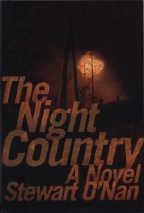The Night Country
Stewart O'Nan
Farrar, Straus & Giroux
US First Edition Hardcover
ISBN 0-374-22215-0
Publication Date: 10-10-2003
229 Pages; $22.00
Date Reviewed: 11-12-03
Reviewed by: Rick Kleffel © 2003

REFERENCES
COLUMNS
|
|
|
The Night CountryStewart O'NanFarrar, Straus & GirouxUS First Edition HardcoverISBN 0-374-22215-0Publication Date: 10-10-2003229 Pages; $22.00Date Reviewed: 11-12-03Reviewed by: Rick Kleffel © 2003 |
|
|
REFERENCES |
COLUMNS |
For most parents, teenagers are the last frontier. Their behavior is consistently inscrutable. What drives them to drink, to drink and drive, to pierce themselves? No amount of reasonable discourse can persuade them to act rationally, to avoid the extremes of youth. Even parents who claim to have remembered their own teenage rebellion can't make a connection. Explanations drive everyone's emotions into retreat. It seems that there is no middle ground until middle ground appears, or until a vast chasm gapes between the generations, inviting everyone on the edge to take the plunge. The teenaged tragedies that result can haunt a town for generations to come. In layers of language, Stewart O'Nan's 'The Night Country' burrows into the dead hearts of suburbia with surgical skill. He plays his prose as if it were a musical instrument, evoking the quiet hours and simple rituals that rule most of our behavior. Closer, ever closer. You're going to get a glimpse of the darkness made light, the shadow that casts the shadow.
A car carrying five teenagers left the road and hit a tree on Halloween exactly one year ago. Three teens died; Marco, Toe and Danielle; two lived, Kyle, whose brain injury leaves him a permanently disabled child, and Tim, intact physically but hammered by guilt. Police Officer Brooks, first on the scene of the accident, has never forgotten what happened, what he found. On this Halloween Eve, summoned by those remembering their fate, the trio of dead teens watches as emotions and events conspire to make a bad situation worse. Their ghosts narrate a story that finds the core of blackness within them.
Stewart O'Nan is operating on a deliberately small scale in 'The Night Country'. His language is the sparse, simple talk of today's teenagers, distilled beyond slang into a sort of timeless style that seems both artful and unforced. There are a limited number of characters. The plot unfolds in two distinct directions. One is the strictly chronological sequence of events that follows the actions of the living on this night. Brooks is an emotional cripple, a moth unable to leave the candle or plunge into the flame. Kyle's mom is succumbing to despair, as she envisions a life of caretaking for her son. Tim plans a special tribute to his friends, forced by his plans to observe himself as if he's a character in a drama that he's watching on TV. Each step taken by every character is filled with unspoken emotions, bordered by the author's language but never directly described. The inevitability of what they will do draws them towards a conclusion that they and the reader sense, but don't wish to face. Moments in time unfolding; a plot of dread and remorse. O'Nan's lyrical language takes the reader on a seductive journey into terror.
Keeping things lively and often humorous, O'Nan provides a parallel journey of ideas. Who is telling the story, how it is being told, and why the storytellers are even there to tell the story provide strong lines of tension and doubt. As in life, the teenagers act as if they know everything about death. But they don't, and as their surprise increases and the readers' understanding of their situation catches up to and surpasses theirs, O'Nan creates a delightful sense of dawning comprehension amongst all parties. Using the genre device of "the rules" -- in this case, the rules of being a ghost -- the author keeps the pages turning at a brisk, enjoyable clip and gives himself a much-needed opportunity for humor.
The language in 'The Night Country' is the real appeal of this novel. Never has elegiac writing been so simultaneously lovely and fun. He keeps things simple. Using parentheses to denote when the dead are speaking, he never drops a beat or a closure. The prose is invigorated by skillful and restrained use of teenage slang, but never in a fashion that seems dated or limiting. The snide asides are the reader's glimpse into characters caught in the headlights between childhood and maturity. It's a quantum flux; the teenagers take form in our perceptions of them.
Ultimately -- this is a book of penultimate and ultimate actions -- 'The Night Country' completes the journey the reader knows it's been making. As the dual plots unwind and entwine, we find ourselves ever closer to that dark spark that animates the teenaged mind. Mindful of the fleeting nature of the teenager, Stewart O'Nan can give only a glimpse of something in motion from one point to another. Unlike light, however, prose can illuminate the dark itself. Words can get inside of shadows and look outward. You'll know it when you see it, the why of what those awkward, mature yet immature humans are doing. It won't last long. Hold your breath; leave the lights off.